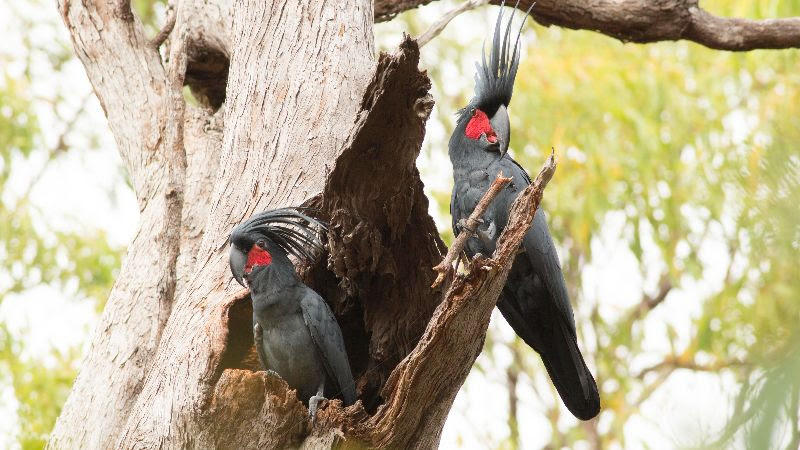
The study looked at birds that used tools “very much like musical instruments”. Photo: Dr Christina Zdenek.
You wouldn’t book palm cockatoos to perform at your wedding, but they just might give a human drummer a run for their money.
Professor at the Australian National University’s Fenner School of Environment and Society Robert Heinsohn said the birds have a unique way of attracting a girlfriend.
“He starts banging [a tool] on the edge of the tree hollow to make this quite loud tapping sound,” he said.
“The result is analogous to what a human drummer would do.
“It’s all about adding to the male’s complex display so it can impress the females.”
This behaviour was examined in a recent study of the population in and around Kutini-Payamu (previously Iron Range) National Park, including Aboriginal freehold lands on the eastern coast of Cape York Peninsula.
The ANU researchers filmed 18 male birds banging their tools and collected discarded ones.
“[The tools] are very much like musical instruments,” Professor Heinsohn said.
“All the males have their own rhythm that they produce – some like tapping really fast, or others will have a bit of a flourish – but they’re always highly consistent.
“As part of this paper’s analysis, we worked out that each male had a style of the tool that they liked, and despite the differences, they were, again, highly consistent.
“We think that individualised component is also an important part of the display.”
Professor Heinsohn said this use of tools by birds – and other animals – is uncommon.
“It’s very rare for animals to make and use tools,” he said.
“The thing about most of the other species that make tools is that they’re always doing it for the purpose of helping to find food or processing food.
“Palm cockatoos are the only bird species, at least, that makes a tool for making sound.”
The Cape York population is also the only member of the wider palm cockatoo population known to use tools.
Professor Heinsohn said the palm cockatoo’s uniqueness caught his eye when he started studying animals on the Cape York Peninsula more than two decades ago.
“It’s only a stone’s throw from the tip of Cape York over the main island of New Guinea,” he said.
“Over evolutionary time, a lot of species from New Guinea have found their way onto the Cape York Peninsula, so that means the wildlife there is a bit different from what you get further south.”
Professor Heinsohn said the data, collected between June and December of 2009 and 2015, was part of a wider study on the palm cockatoo’s conservation needs on the Cape York Peninsula.
“It took that long because the birds are shy and elusive, so it takes a lot of time to creep up on them in the bush and get enough video that you can analyse,” he said.
“At the same time, the population is dropping all the time because the birds are endangered.
“The data is actually getting harder and harder to collect because there’s fewer and fewer birds out there.”
Despite the challenges, Professor Heinsohn said he would continue researching the birds.
“We’ll go on collecting data on this remarkable drumming behaviour because it is so interesting,” he said.
“This tool use is part of what makes members of that population so special and unique and worth conserving.
“It’s a really unique form of behaviour, and if we lose those birds, we’ll also lose something that’s truly remarkable in nature.”
The study has been published in Proceedings of the Royal Society London.












